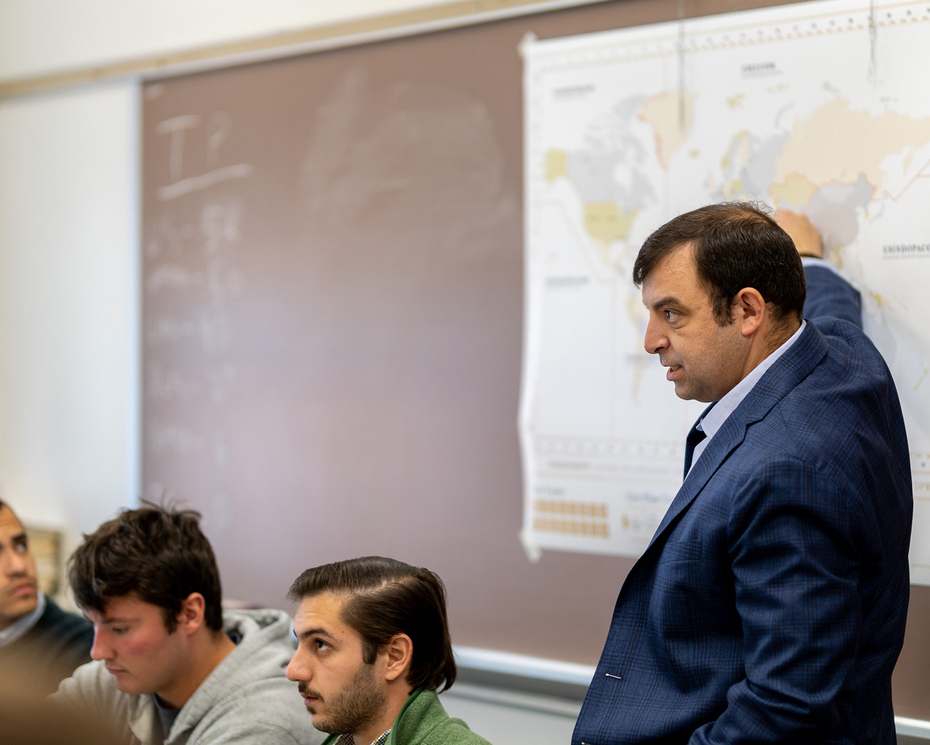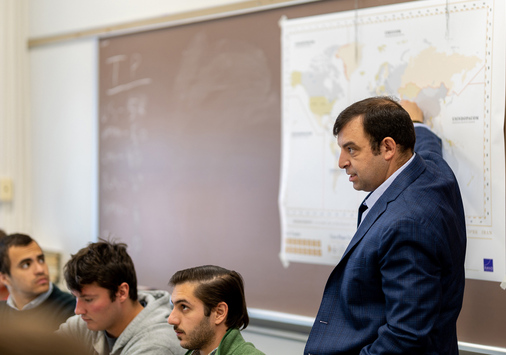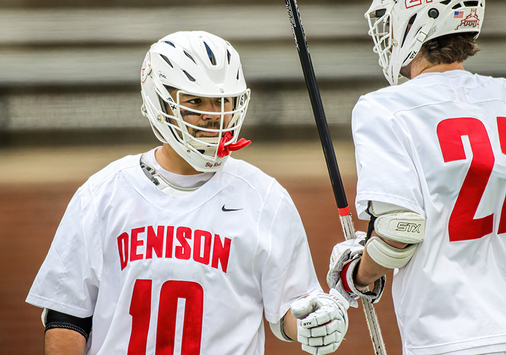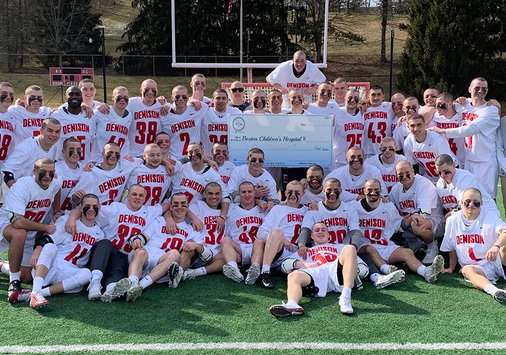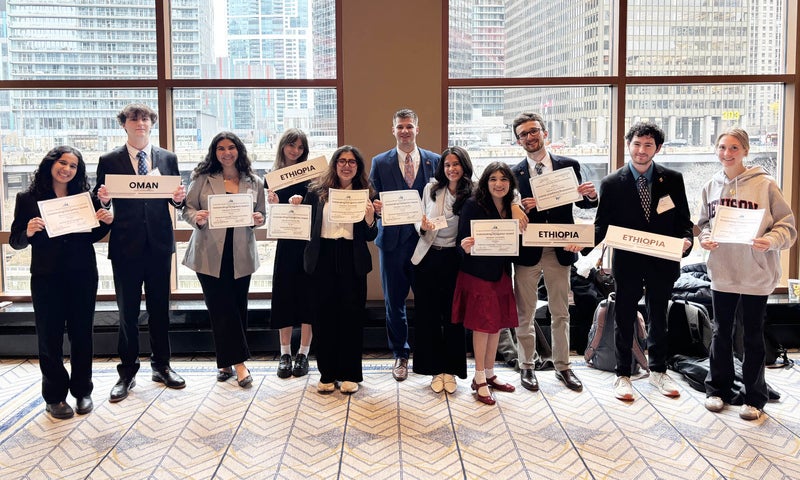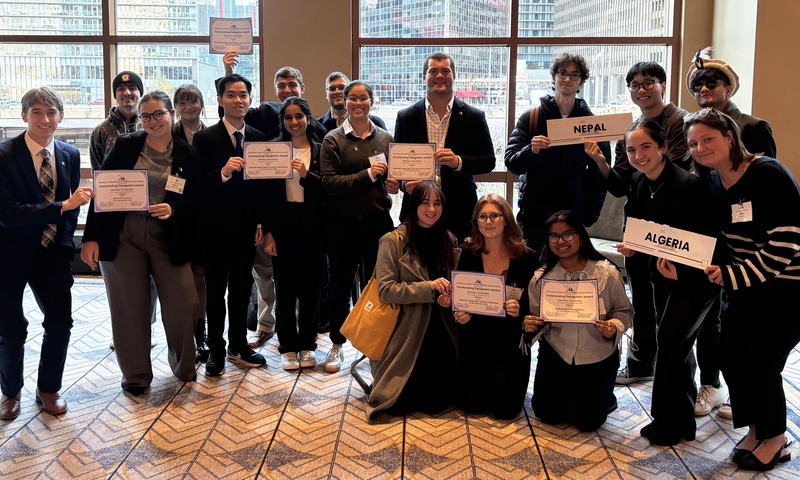Courses
2025 - 2026
For this academic year's course catalog, please visit our Academic Catalog site. For courses currently offered, please refer to the Schedule of Classes.
Off-Campus Experience.
This course provides a venue in which to explore topics in American Politics at the introductory level. Topics will vary according to the needs and interests of the teaching faculty offering the course. In some cases, this course may be repeated for credit.
This course will introduce students to the politics of democratic states. Among the states considered in this course are: the United States, the United Kingdom, France, and Germany. Much of the course will focus upon politics and policies in individual countries, however, the course will also seek to compare political phenomena across states and look at some conceptual and theoretical issues that these systems have in common.
This course provides a venue in which to explore topics in Comparative Politics at the introductory level. Topics will vary according to the needs and interests of the teaching faculty offering the course. In some cases, this course may be repeated for credit.
This course provides a venue in which to explore topics in International Politics at the introductory level. Topics will vary according to the needs and interests of the teaching faculty offering the course. In some cases,this course may be repeated for credit.
This course provides an introduction to both the language used to describe international politics and the ways relationships between actors on the world stage may be analyzed. Relying on history and contemporary events to illuminate key concepts, we cover the causes of war and peace, the role of economics in international affairs and the place of morality in statecraft. This course is recommended as preparation for advanced study in the areas of international relations and foreign policy.
This course provides a venue in which to explore topics in Political Theory at the introductory level. Topics will vary according to the needs and interests of the teaching faculty offering the course in some cases, this course may be repeated for credit.
An introduction to the art and science of political philosophy. This class teaches the skills of making normative arguments in the context of understanding politics as purposive behavior. What should be the means and ends of government? What kind of government should we create, and how will power be distributed? How should we prioritize our commitments to ideas like order, justice, liberty, and equality? What role do our material realities, our economies and our culture play in the formation of our identities and our commitments? This course will link normative arguments to contemporary political and policy debates about the state and governing, rights, obligations, diversity and multiculturalism.
A general category used only in the evaluation of transfer credit.
All PPA majors are required to complete Sophomore Seminar in the spring of their sophomore year. Sophomore Seminar will serve three purposes. First, Sophomore Seminar will provide students with an opportunity to integrate their learning experiences in our three introductory courses. Second, students will gain an understanding of how to conduct research and evaluate political and policy issues through a series of shorter assignments culminating in completion of a substantial policy analysis paper. Third, over the course of the semester, students will develop a coherent plan for an established track of study within PPA which identifies relevant cognate courses or proposes and develops an individualized track of study.
Prerequisite(s): PPA 102, 122, and PPA 132, or consent of instructor.
A general category used only in the evaluation of transfer credit.
This course focuses on the history of the presidency with particular attention to the origins, development, and exercise of executive powers. We also examine writings on the character, policies, reputation, and rhetoric of individual presidents; presidential management of the executive branch; and presidential leadership of Congress.
Prerequisite(s): PPA 201, or consent of instructor.
The U.S. Congress is often considered the 'First Branch" of the federal government, and by its construction is easily the most complex. In this course we will consider the politics that underlie the development and operation of the contemporary Congress, detail the legislative process and its organization. We will consider how various institutions such as parties, committees, and procedures help legislators reach their goals and help solve problems such as collective action, voting cycles, and ambition. While we begin by looking at Congress at its inception and the electoral goals of members, the course will quickly move to the development of these institutions and in the early Twentieth Century (pre-1974) and their use today. Over the course of the semester, we will apply our institutional study of Congress to current events and through a multi-week simulation of the legislative process. Since many of the readings make use of existing quantitative data and existing research prior experience with this type of material is recommended.
Prerequisite(s): PPA 201 or consent of instructor.
This course examines the structure, strategy, and influence of federal campaigns and elections in the United States. With a focus on both Congressional and Presidential campaign contests the course explores topics such as primary and nominating politics, the role of money in elections, candidate selection, incumbency advantage, the influence of elections on voting behavior, campaign strategy, advertising, and election reform. Throughout the course we will apply the readings to analyze the current election cycle, historical trends, and election forecasting. In addition, students will participate in a simulated campaign exercise. By the end of the semester students will complete a research paper investigating data related to congressional campaigns centered on questions raised by one or more of the topics covered in class.
Prerequisite(s): PPA 201, or consent of instructor.
Foreign policy formulation is concerned with how internal factors shape a state's policy toward the outside world. Traditionally, foreign policy analysts considered the state as a unitary actor. Today, we are more appreciative of the multiple domestic inputs in foreign policy making, and more sophisticated in the use of analytic tools to facilitate our understanding of the foreign policy formulation process. The class is structured around four distinct “sources” of US foreign policy formulation: institutional; role; societal; and, individual. While we cover each source in distinct units for purposes of analytic clarity, throughout our study we will observe that no one decision can be explained fully without some overlap of sources.
Prerequisite(s): One 100-level PPA course, or permission of the instructor.
This course provides a venue in which to explore topics in American Politics at the advanced level. Topics will vary according to the needs and interests of the teaching faculty offering the course. In some cases, this course may be repeated for credit.
Prerequisite(s): PPA 201 or consent of instructor.
This course will focus on contemporary issues and policy debates in European politics. We will look at a broad range of countries such as Poland, Spain, Denmark, the Czech Republic, and others. Some of the issues discussed could include: health care policies, minority rights and minority communities, energy politics, and more. The exact issues, policies, and countries will vary over time.
Prerequisite(s): PPA 201 or consent of Instructor.
What accounts for the emergence, persistence and demise of "radical" or "far right" political parties in Europe? After a period of post-war stability, European party systems began to break down in the 1960s. This led to several new developments, namely, a decline in democratic participation; a decline in the traditional parties of the center Left and center Right; and the emergence of new parties on both the Left and the Right. This course focuses on the newer parties on the Right that emerged in Western Europe during the 1980's and 1990's. Specifically we focus on what many scholars label the "far" or "radical" right. These parties tend to be organized around a particular set of ideological concepts emphasizing nationalism, exclusion of "foreigners," a strong state, welfare chauvinism and, more recently, Islamophobia. Over the course of the semester students will compare and contrast the emergence of these parties and their politics across Europe and discern the differences between what scholars describe as "populist radical" or "populist far" right parties from other parties on the extreme right, namely neofascist or neo-Nazis parties which are viewed as inherently undemocratic and often elitist.
This course provides a venue in which to explore topics in Comparative Politics at the advanced level. Topics will vary according to the needs and interests of the teaching faculty offering the course. In some cases, this course may be repeated for credit.
Prerequisite(s): PPA 201 or consent of instructor.
This course explores the evolution of U.S. foreign policy from the beginning of the Cold War to the present day. The course focuses on the responses of successive American administrations to potential or actual threats to the national interests of the U.S. Emphasis will be placed on the containment doctrine, its application in Vietnam, and subsequent efforts to replace containment following the end of the Vietnam war and the end of the Cold War.
Prerequisite(s): PPA 201 or consent of instructor.
The founding of public international organizations represent an attempt to bring order to an unruly international system. International organizations are formal institutions established by states to address global problems. They include not only the United Nations, but also many other public or private, international, national or local, formal or informal institutions. Collectively, these institutions engage in global governance. Our goals in this course are to understand the theoretical and practical approaches to international organizations and global governance, the limitations under which global governance operates, and the future prospects for a system of global governance. This course has a substantial oral component and oral skills work and so satisfies the University's oral general education requirement.
Prerequisite(s): PPA 201 or consent of instructor.
This course analyzes the emergence, expansion and enforcement of international human rights norms. Students taking the course will acquire an enhanced understanding of the United Nations, national governments, nongovernmental organizations, customary international law, treaty law, regional courts, and international tribunals in articulating and enforcing human rights. Students will acquire a broad understanding of human rights as a topic of both intellectual inquiry and political action.
Prerequisite(s): PPA 201 or consent of instructor.
Crosslisting: INTL 265.
The course explores the peculiarities of the EU and what makes it a unique organization, sharing characteristics of a state and characteristics of a traditional international organization. First, we will place the study of European integration in a historical context. Then we will make sense of the various decision-making processes and institutional actors of the EU. We will also examine theories of European integration to understand competing explanations for the integration process. Fourth, various policy areas will be studied to show how the power of the EU is distributed unevenly across areas. During the final two weeks of the course we will simulate a gathering of the European Council. This course has a substantial oral component and oral skills work and so satisfies the University's oral general education requirement.
Prerequisite(s): PPA 201 or consent of instructor.
Political violence, including terrorism, has been around since the beginnings of organized political society, though the word terrorism dates only from the French Revolution (1789-1799). In this course, we will explore what terrorism is, whether it is new (and why some analysts argue it is), who uses terrorist tactics, why they do so, and how terrorism differs from other forms of political violence such as war, insurgency, and so on. We will investigate various definitions of terrorism. Most scholars think that terrorism is not a random act of violence. They see terrorism as planned and, for those who use it, rational. However, there is still a lot of disagreement on what terrorism is, what motivates terrorists, how it can be fought, and on what we mean by rational and planned. We will compare the various definitions and perspectives to determine which might work best for our understanding of the phenomena. In addition, we will focus on some key concepts in the discipline of political science and how they relate to terrorism, for example: power, ethnicity, religion, and the media.
Prerequisite(s): PPA 201 or consent of instructor.
This course provides a venue in which to explore topics in International Politics at the advanced level. Topics will vary according to the needs and interests of the teaching faculty offering the course. In some cases, this course may be repeated for credit.
Prerequisite(s): PPA 201 or consent of instructor.
A student in good standing may work intensively in areas of special interest under the Directed Study plan. A Directed Study is appropriate when, under the guidance of a faculty member, a student wants to explore a subject more fully than is possible in a regular course or to study a subject not covered in the regular curriculum. A Directed Study should not normally duplicate a course that is regularly offered. Directed Studies are normally taken for 3 or 4 credits. A one-semester Directed Study is limited to a maximum of 4 credit hours. Note: Directed Studies may not be used to fulfill General Education requirements.
A student in good standing may work intensively in areas of special interest under the Directed Study plan. A Directed Study is appropriate when, under the guidance of a faculty member, a student wants to explore a subject more fully than is possible in a regular course or to study a subject not covered in the regular curriculum. A Directed Study should not normally duplicate a course that is regularly offered. Directed Studies are normally taken for 3 or 4 credits. A one-semester Directed Study is limited to a maximum of 4 credit hours. Note: Directed Studies may not be used to fulfill General Education requirements.
Independent Study engages a student in the pursuit of clearly defined goals. In this effort, a student may employ skills and information developed in previous course experiences or may develop some mastery of new knowledge or skills. A proposal for an Independent Study project must be approved in advance by the faculty member who agrees to serve as the project advisor. Note: Independent Studies may not be used to fulfill General Education requirements.
Independent Study engages a student in the pursuit of clearly defined goals. In this effort, a student may employ skills and information developed in previous course experiences or may develop some mastery of new knowledge or skills. A proposal for an Independent Study project must be approved in advance by the faculty member who agrees to serve as the project advisor. Note: Independent Studies may not be used to fulfill General Education requirements.
This course examines the basic principles of the U.S. Constitutional framework from an interdisciplinary perspective. What is the purpose and function of law in society? How does the legal process work through precedents, legal reasoning and case law? What are civil rights and civil liberties? Where are the lines or boundaries to be drawn between an individual’s freedom and the public good or the rights of the community? Which liberties does the Court consider worth protecting and which liberties are circumscribed by the public interest? What might be the difference between liberty as a legal concept, and freedom? This course examines important political and theoretical questions regarding the rule of law, interpreting the Constitution, and the role of the Supreme Court in the U.S. system of politics and government.
How have ideas about race shaped law, legal institutions, and legal practices in the United States? Conversely, how have law, legal institutions, and legal practices shaped how we think about and make race? In line with the work of Critical Race Theorists (such as Derrick Bell, Kimberlé Crenshaw, and Gary Peller), the fundamental assumption of the course is that these two domains are integrally related, such that to think of or analyze one requires thinking of or analyzing the other, as well. Thus, studying race without considering law’s role in shaping race is deficient, and studying law without considering how race has shaped shaped it is similarly unsatisfactory. This follows from contributions by scholars such as Michael Omi and Howard Winant who argue that categories of race are sociohistorical formations rather than eternal essences and that racial categories can be created, transformed, and destroyed; part of our work in this course will be to trace how categories of race in US politics have been built by law and within legal practices and institutions. To better understand our world, we should consider how they work together to shape our institutions and lives. The bulk of the course will consider the interaction between race and law in major policy areas such as immigration, incarceration and policing, education, or housing.
Prerequisite(s): PPA 201, BLST major/minors or consent of instructor.
Debating classical Greek and Roman thought through the works of thinkers like the Greek tragedians, Socrates, Plato, Aristotle, Cicero, Augustine or Aquinas. This course involves intensive textual analysis and a study of the problems of morality, government, membership and expansion in the ancient Greek and Roman world. We will also judge the moral and political legacy of the ancients by addressing contemporary debates about democracy, citizenship, power, empire, and the rule of law.
Prerequisite(s): PPA 201 or consent of instructor.
Debating the moral and political problems of modernity through the works of thinkers like Machiavelli, Hobbes, Locke, Rousseau, Kant, Hegel, Burke, Paine, or Mill. This course involves intensive textual analysis and a study of the problems of virtue, interest, power, sovereignty, rights, and revolution in the modern era. We will also judge the place of ideas like liberty and equality within the system of law in republican, liberal, conservative and radical political thought.
Prerequisite(s): PPA 201 or consent of instructor.
Debating contemporary political theory through the work of such thinkers as Marx, Nietzsche, Dewey, Arendt, Fanon, Marcuse, Foucault, Rawls, Habermas, Walzer, or Butler. This course involves intensive textual analysis and a study of the problems of power, capitalism, rights, obligations, culture, and identity in the contemporary era. We will also judge the legacies of radical, liberal, and pragmatic thought, and the challenges offered by critical theory, feminism, and post-colonial studies.
Prerequisite(s): PPA 201 or consent of instructor.
This course focuses on black political thought in the United States and around the world by considering how Afrocentric scholars, activists, and intellectuals have considered and acted to realize justice for Black persons (and thus for all persons). The course will broadly focus on the experience of blackness since ~1500CE, also known as “modernity.” This choice of periodization is based on arguments made by foundational theorists of race such as Orlando Patterson, Omi & Winant, and Charles Mills, among others, who argue that racial formation is a sociohistorical process that unfolds over time and place, such that categories of race are neither eternal, unchangeable, or material, but subject to creation, evolution, and transformation through intellectual, political, social, and legal struggles. While we may experience race as real, the creation of race as a category of meaning was a political project. We will pay special attention to the experience and political significance of enslavement, colonization, and Afro-independence struggles to consider the meaning of freedom and grapple with contemporary legacies of violence. How does Black Political Thought enrich our understanding of significant political questions such as the nature of political equality, justice, and democracy? The course may include, among others, thinkers such as David Walker, Maria Stewart, Frederick Douglass, Ida B. Wells, Booker T. Washington, W. E. B. Du Bois, Alain Locke, Franz Chinua Achebe, Fanon, Martin Luther King, Jr., Malcolm X, James Baldwin, Audre Lorde, Patricia Hill Collins, Orlando Patterson, Michael Omi and Howard Winant, Michael Dawson, Ta-Nehisi Coates, Angela Davis, and Claudia Rankine.
An examination into the issues, debates, debates and contested ideals of American political theory. Liberal, radical, and conservative perspectives on American political life are canvassed through a study of primary texts. Authors may include Jefferson, Madison, Tocqueville, Douglass, Stanton, Lincoln, DuBois, and King, in addition to others varying with the instructor’s expertise. We will address debates about colonialism, constitutionalism, federalism, rights, equality, popular sovereignty, and slavery, as well as religion, the long term legacies of both industrial capitalism, and race, and gender, and their long- term legacies. No FYS.
Prerequisite(s): One PPA 100-level course or consent of the instructor.
This course provides a venue in which to explore topics in Political Theory at the advanced level. Topics will vary according to the needs and interests of the teaching faculty offering the course. In some cases, this course may be repeated for credit.
Prerequisite(s): PPA 201 or consent of instructor.
A general category used only in the evaluation of transfer credit.
Students may enroll in Senior Research in their final year at Denison. Normally, Senior Research requires a major thesis, report, or project in the student's field of concentration and carries eight semester-hours of credit for the year. Typically, a final grade for a year-long Senior Research will not be assigned until the completion of the year-long Senior Research at the end of the second semester. Each semester of Senior Research is limited to a maximum of 4 credit hours. Note: Senior Research may not be used to fulfill General Education requirements.
Students may enroll in Senior Research in their final year at Denison. Normally, Senior Research requires a major thesis, report, or project in the student's field of concentration and carries eight semester-hours of credit for the year. Typically, a final grade for a year-long Senior Research will not be assigned until the completion of the year-long Senior Research at the end of the second semester. Each semester of Senior Research is limited to a maximum of 4 credit hours. Note: Senior Research may not be used to fulfill General Education requirements.
Senior Seminar is a required part of the politics and public affairs major and is offered only in the fall semester. Senior seminars will vary in topic but all emphasize skills in research and writing that will provide a capstone experience in the major. For senior majors. Others with consent of instructor.
